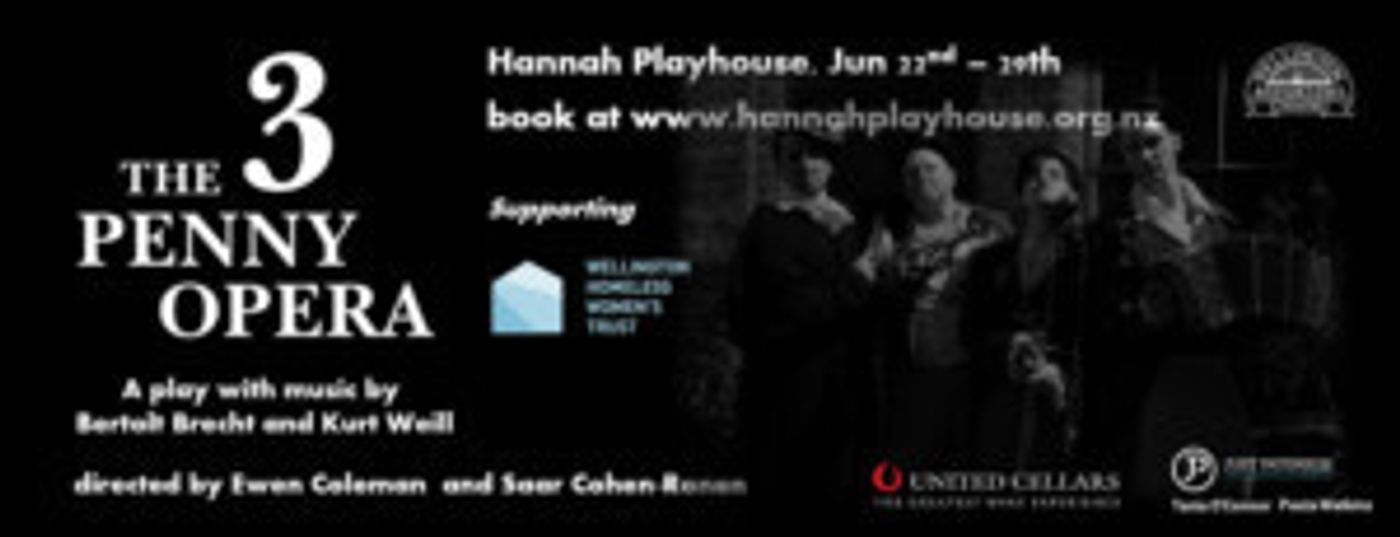Review: THE 3 PENNY OPERA at Hannah Playhouse

Reviewed by Lindsey Rusling
Director: Ewen Coleman and Saar Cohen-Ronen
Musical Director: Saar Cohen-Ronen
Theatre Company: Wellington Repertory Theatre
Weill. Brecht based his play on The Beggar's Opera written by John Gay in 1728 and set
the action in Victorian England. Brecht recognised that Gay's satirical anti-Opera
(lampooning the grandiose Italian Opera style) was the perfect vehicle to express his Marxist critique of capitalism.
A young, deliciously snarky Polly Peachum (beautifully sung by Brontë Buchanan) elopes with notorious criminal Macheath (the subject of the Opera's most famous song: "Mack the Knife") much to the chagrin of her gin-soaked Mother (Janet van Polanen) and Dickensian Father (Colin Eade) who elicit a manhunt for the charming and dangerous crime lord.
Ben Priest as the constantly lustful Macheath was in fine voice and imbued his character with the typical aggression of a Cockney wide boy throughout, although it would have been good to have seen Macheath's more charming personality from time to time to emphasise his dangerously violent nature. "Pardon Me" was a powerfully compelling and gripping highlight.
"Tiger" Brown (Neil Brewer) exemplified a typical 'good ole boy' corrupt cop while daughter Lucy (Sophie Russell) displayed her operatic ability with a German aria.
All the supporting cast collaborated as a unit, performing with focus, strong vocal, good use of space and creating character believably. Matt (Chris Gordon) and the "Gang" used wonderful, bumbling comic timing, particularly in their hilarious dancing, Neil Rusling brought the laughter with many a playful antic and the "Girls" were suitably brazen and cynical. Joanne Lisik, however, was a standout as the Machiavellian, Low Dive Jenny strutting around the stage with cool assurance and contempt to create a captivating performance of the disloyal prostitute and singing her songs (especially the well-known "Pirate Jenny") with gritty passion.
The storyline is a study of criminality at all levels and while characters unapologetically sing songs about the fact that the misery human beings inflict on each other is the foundation of our society, they continue to participate wholeheartedly in that corruption. As the play opens: "The beggars are begging, the thieves are stealing and the whores are whoring."
These characters are symbols for the injustice of the capitalist system, where the rich get richer, the poor get poorer and where everything and everyone has a price.
The contrast between the funny and light action of the play and this uncomfortable subtext is what Brecht hoped would cause people to think more about his political message rather than "hanging their brains up with their hats in the cloakroom". This alienation effect typifies Brecht's Epic Theatre which he used to criticise society's dishonesty, hypocrisy and greed.
Within the play, these vices (such as Mr Peachum's workshop for beggars) are so
exaggerated that it becomes funny and then somewhat uncomfortable when the politicalmessage of structural violence actually hits.
Directors; Ewen Coleman and Saar Cohen-Ronen have somewhat altered the original script using contemporary material and local knowledge for maximum comic effect. The play remains cohesive and Coleman and Cohen-Rohen stay true to Epic Theatre through; meticulously incorporating a large number of Brechtian techniques such as placards (AV),narration, names on props, direct address, leaving working lights on etc. and successfullyinstructing their talented cast on the form's presentational rather than representational acting style.
On entering the auditorium, the cast and crew are clearly visible and spend the entire
performance on stage either sitting upstage or using the costume rack to get changed into apposite, historical costume in full view of the audience. The constant breaking of the fourth wall creates a tangible relationship between the audience and the cast and enables that gentle "wink" and acknowledgement that we are on this journey together.
The set is arranged like a criminal, underground Victorian boxing ring to begin and the theme continues with a ring girl carrying through a number at the beginning of each Act. The Hannah's concrete walls are a perfect foil for the sordid tone of the play and an atmospheric backdrop for The Warehouse, prison and whorehouse scenes.
Cohen-Ronen is also the Musical Director and much of the power of this production owes itself to the stunningly vibrant, fourteen-piece band who are also present throughout. The orchestration is a hybrid of musical genres such as jazz, cabaret and tango that is deliberately set at odds with the lyrics to increase alienation much like Brecht's writing. Both the musicians and vocalists comfortably rise to the challenge of the spiky harmonies and the penetrating edge of the invasive jazz-band instrumentation and the inclusion of song lyrics along the back wall was a delightfully, unexpected feature that enhanced audience comprehension and enjoyment.
At times verging on the absurd, this production of the Threepenny Opera (in support of the Wellington Homeless Women's Trust) is thoroughly entertaining, at times unsettling and indicative of the work's continuing popularity and relevance although the purposeful crude scenes, caustic wit and dissection of the hypocrisies of the bourgeois morality may not be for everyone.
Reader Reviews
Videos

